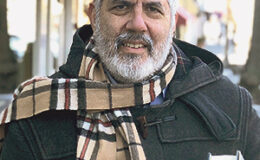

At a time when researching family history is booming, the nation’s immigration and citizenship agency has proposed dramatically hiking fees to access records from the first half of the 20th century. The move has outraged professional and amateur genealogists, who argue that the increase would effectively put valuable immigration information out of reach for many.
The fees would nearly triple, and in many cases, they would rise nearly 500 percent, from $130 to $625 to obtain a single paper file. The little-known Genealogy Program administered by U.S. Citizenship and Immigration Services allows genealogists, family historians and other researchers to obtain citizenship and alien registration files, visa applications and other records documenting the lives of deceased immigrants who arrived in the United States between the late 19th and mid-20th centuries.
The waves of western and southern Europeans who came through Ellis Island at the turn of the century are included in the records, as are Jews who sought refuge from Nazi Germany before World War II and Mexican guest farmworkers who helped stem the labor shortage during the conflict. They were followed by Holocaust survivors and those fleeing Communist rule in Central Europe and the Soviet Union.
The files sometimes include hundreds of pages, documenting long waits at Ellis Island or, in the case of Japanese, Italians and Germans who lived in the United States during World War II, FBI reports about the immigrant’s friends, family and political activities.
The fee increase “has to be very important to anyone who does hobbyist genealogy. It would make it impossible for most average people to access” the files, said Rich Venezia, a Pittsburgh-based professional genealogist who teaches courses on how to obtain the USCIS records.
Venezia is spearheading a public campaign to persuade the agency, now under the leadership of acting deputy homeland security secretary Ken Cuccinelli, to withdraw the fee hikes before the window for public comment closes on Dec. 16.
U.S. Citizenship and Immigration Services officials declined to explain exactly how they arrived at the new fee amounts. But the agency has said that it must increase fees across the board – including substantial hikes for green card and citizenship applications – to avoid a $1.26 billion annual budget shortfall. By law, USCIS must fund itself through fees.
“USCIS is required to examine incoming and outgoing expenditures, just like a business, and make adjustments based on that analysis,” the agency said in a statement. A date has not been set for the new fees to go into effect.
The increases come at a time when millions of Americans are discovering a passion for family genealogy, spurring the growth of websites and services that cater to them. Ancestry.com, one of the most popular, now has more than 3 million paying subscribers perusing its databases of documents and DNA connections.
These amateur genealogists and their professional counterparts extol the value of the USCIS files in unraveling family histories and, in some cases, revealing long-buried secrets.
Jennifer Mendelsohn’s request for an alien registration file in 2017 revealed one such family secret, which the Baltimore journalist and genealogist found oddly amusing. Mendelsohn’s great-grandfather, Meyer Stanger, had been among a group of men arrested for grand larceny after fencing $36,000 in dungarees and aprons stolen from the factory where he worked, according to a news report from the time surfaced by Mendelsohn. Not exactly the crime of the century, she noted.
Much more consequentially, Mendelsohn said, she never would have known her great-grandmother’s hometown were it not for a USCIS file she obtained in 2018.
“Her life defied genealogical inquiries,” Mendelsohn said. “She never did anything in the U.S. that yields information.” Yetta Cushman, who immigrated around 1890, never became a U.S. citizen and died before Social Security existed. “There was absolutely no trail.”
Mendelsohn discovered the existence of Cushman’s brother, who lived in Brooklyn, through a DNA test and later obtained his alien registration form. Listed there was the family’s hometown: Savran, Russia, now part of Ukraine. The discovery was important to her family’s sense of identity, she said, and has inspired her to dig deeper.
Mendelsohn’s penchant for genealogical research extends well beyond her own family, as founder of the viral “Resistance Genealogy” project that unearths the family histories of pundits and politicians who target immigrants.
While Mendelsohn doesn’t request USCIS files for those genealogical digs due to long wait times, she said the fee hikes underscore her sense that the Trump administration takes “an antagonist stance” toward immigration, both present and past.
“What’s frustrating to me is that we have no other recourse,” but to pay the price USCIS sets for the files, said Mendelsohn. “There is no other way to get this information. . . . If they can do this to these records, they can do this to any records. It’s incumbent upon us to speak up and try to stop this.”
Alex Calzareth, a family historian in Long Island City, New York, is an especially heavy user of the genealogical program, having obtained more than 550 files from USCIS, many through the Freedom of Information Act, before the agency started charging for the files in 2008.
After securing a naturalization, or C-File, in 2002, Calzareth discovered precisely why his divorced great-grandparents had remarried after escaping the German invasion of Czechoslovakia and immigrating to the United States in 1940.
The Immigration and Naturalization Service recommended denying the cohabitating couple’s petition for citizenship in 1945 due to “poor moral character,” Calzareth said. Felix and Grete Rafael decided to call as a witness their rabbi, who testified that they were still married under Jewish law.
As it turned out, the presiding judge was a celebrated Jewish lawyer, Simon Hirsch Rifkind, and he happened to know the Rafaels’ rabbi during World War II, Calzareth said. The Rafaels retied the knot, and Rifkind greenlighted their citizenship, he said.
“My grandmother knew Judge Rifkind was involved, but not exactly how,” and no one in the family knew what had exactly had prompted the Rafaels to remarry, Calzareth said.
Because a chunk of the file fee is due before the requester even knows if a file exists, Calzareth said he considers himself fortunate to have already obtained so many records. The proposed new fees would be prohibitive, he said.
“Family stories aren’t always reliable,” Calzareth said. ” . . . There’s often a kernel of truth in a family story, but without the documentation, all you have is, ‘People say this happened but I don’t know if it was true.’ ”
Old photos contained in the file can serve as important clues or provide the only image a family will ever have of an ancestor.
Venezia told the story of a colleague descended from Holocaust survivors who had lost all family photos during the war. The USCIS file contained a photograph of the colleague’s grandfather as a young man that is now treasured by the whole family.
The files are often necessary for people who want to obtain ancestral dual citizenship, he said. Venezia used them himself to secure Italian citizenship.
Some of the files are scheduled to transfer to the National Archives, where they can be accessed free by the public in person, but the vast majority of the information contained in the files is not available outside of the USCIS program, he said.
Venezia said he is puzzled by the jump in fees, especially given that the program nearly tripled fees in 2016, explaining at the time that the new fees would fully cover the program’s costs, he said.
“What could possibly have changed in three years to warrant such a huge increase?” he asked.














